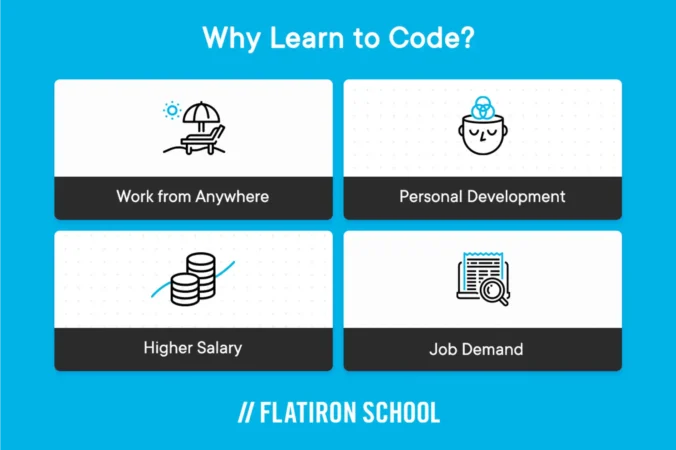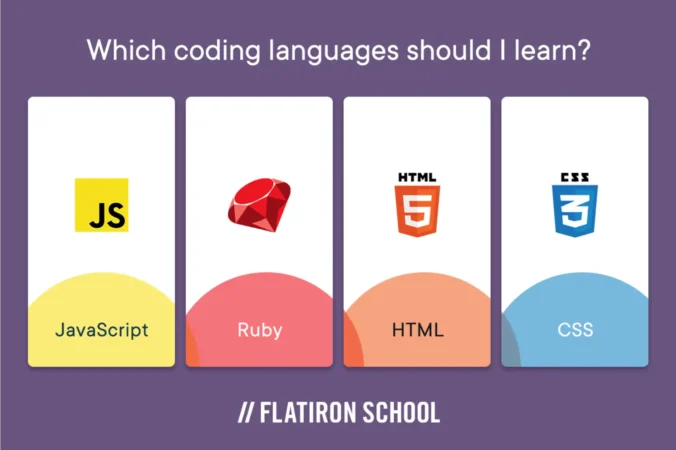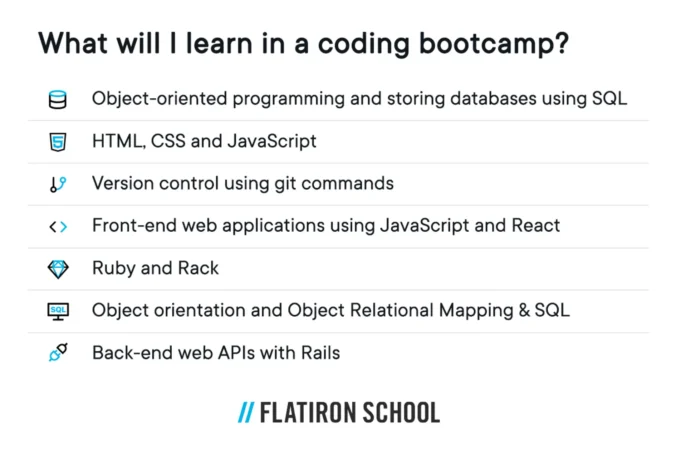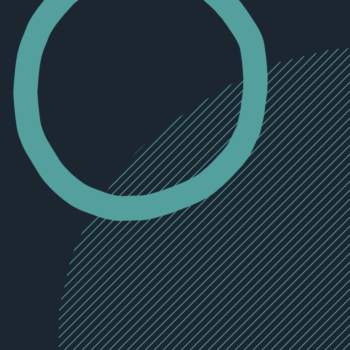
Why Learn to Code?
So you’re thinking about learning to code …You like the idea of becoming a programmer. You know it’s a lucrative career (the average salary for programmers is nearly $77,000*) with plenty of job opportunities (there were over 40,000 job openings for software engineers in 2020). And all that adds up to more career freedom—you’re ready to escape jobs that make you feel stuck.
But you don’t know anything about learning to code. Where does someone even get started?
No need to worry. There’s no newbie too new to learn from our guide to coding for beginners.
You’ve got limited time and energy to devote to new pursuits, so before you embark on an undertaking like learning to code, you need to know it’s the right choice for you. Coding skills open the door to a lot of career opportunities and benefits.

Work from anywhere
Coding is work you can do from almost anywhere. For some people, that means the adventure of getting to travel more and take your work with you. For many others, it means a much easier time balancing your work with the rest of your life. If you can work when and where you want, fitting your other responsibilities—and just as importantly, your interests and hobbies—into your life becomes possible again.
Personal Development
If you hate going through the motions day after day at work, then you need a career that brings ongoing challenges. With coding, you always have more to learn. Problem solving is a big part of the job. And after you conquer one coding language, you’ve got a list of others to turn to.
Higher Salary
Maybe your grandma taught you it was rude to talk about money, but let’s not beat around the bush. Money matters. And jobs that involve coding pay well. The average starting salary graduates of the Flatiron School’s programs make is $74,962.** And that’s just the starting salary. Over time as you gain more experience, it’s only likely to grow.
**For job-seeking students who accepted full-time salaried jobs during the reporting period and disclosed their compensation. The average starting salary for students who took full-time contract, internship, apprenticeship, or freelance roles and disclosed compensation was $32/hr. Average pay for a part-time role was $26/hr (see full Jobs Report report here).
Job Demand
When you have a skill that’s in demand, you suddenly have room to be picky in the jobs you choose. And coding jobs are definitely in demand. Glassdoor’s list of best jobs in the U.S. is dominated by software engineering and developer jobs.
Lots of job openings mean lots of options, and more power to be choosy when it comes to things like benefits and work environment. And coding careers offer variety. You can choose from a number of types of jobs and industries to work in.
How Do You Learn to Coding for Beginners?
The little word “code” describes a big category. It encompasses a lot of different types of skills, programming languages, and potential career paths. That’s part of what makes coding for beginners tricky—it’s hard to know where to start.
Narrow it down
A smart first step is to narrow down your options. Do a little research into the different types of coding professions and what each entails. Maybe you want to learn to build tech products like websites, software, and apps. Maybe you want to build software. Or maybe you want to focus on websites only.
Once you’ve figured out what you want to do with your coding skills, you’re in a better position to figure out how to start the process of learning.
Choose how you’ll learn.
When you have a clearer idea of your probable end goal, you can make a clear plan to move forward. For example, do you want to teach yourself or do you prefer a more structured education like signing up for a coding course? Many coding beginners start with free lessons to get a solid foundation, then switch to a more intensive bootcamp after they have the basics covered.
Stick with it, and build on what you learn.
A plan is only as good as your ability to follow through on it. It’s OK to change the plan as you go based on what you learn—maybe you realize you’re actually more interested in app development than data analysis. But don’t let your initiative drop, or you’ll lose momentum. And expect learning to code to be an ongoing process. Each new skill or language you develop can open the door to additional skills and languages to learn. The more you learn, the more valuable your skills will be on the job market.
Plus, for many people, this is part of the fun of learning to code — there’s always something new to learn as languages are released in new versions.
Which coding languages should I learn?
Most coding beginners will want to start with one of the four most popular programming languages. These are used by businesses across industries and for a number of purposes, which makes them a smart place to start if you want to gain a skill that will translate to career opportunities. Plus, they’re more beginner friendly than some of the more advanced languages you may want to work your way up to.

JavaScript
JavaScript is the first on this list for a reason. It’s the most popular language among developers, because it’s both versatile and relatively easy to learn. JavaScript can be used to build websites, mobile apps, and web servers—which as you can imagine translates to a lot of different career opportunities. Plus, it can be used for both back-end and front-end web development. And it works well in conjunction with other programming languages, so it’s a good starting point to build off of.
Oh, and did we mention it’s extremely common. According to W3Techs, around 97% of all websites use JavaScript.
Fast facts about JavaScript
- JavaScript is a good language for building websites, web servers, and mobile applications. It’s especially useful for interactive features, such as games, video players, and interactive maps. But it’s also useful in jobs as varied as data scientist and cyber security specialist.
- According to Ziprecruiter, the average salary for a JavaScript developer is $107,529 a year. Note: this number is currently in June 2021 and doesn’t represent an entry-level role.
- Jobs that use JavaScript include: software engineer, front-end developer, full-stack developer
- You can learn JavaScript basics for free with an online coding lesson: Intro to JavaScript.
Ruby
Ruby is another programming language that has a reputation for being relatively easy for beginners to learn. It’s most commonly used for web applications, including those with complex functionality like e-commerce sites and online databases. While Ruby’s popularity has been known to fluctuate over the years, enough programmers know and love the language that it’s shown staying power. In fact, one of the biggest draws of learning Ruby is the large and supportive community of Ruby developers that are happy to provide resources and advice to beginners and experts alike.
Fast Facts about Ruby:
- Ruby is a good language for web applications, including websites that require databases, content management, and e-commerce functionality.
- According to Ziprecruiter, the average salary for a Ruby programmer is $98,798 a year (June 2021).
- Several notable tech companies use Ruby, including AirBnb, GitHub, and Shopify.
- Jobs that use Ruby include: software engineer, back-end developer, application developer
- You can learn Ruby basics for free with an online coding lesson: Intro to Ruby.
HTML
HTML (short for hypertext markup language) isn’t truly a “coding” language, but more of a markup or scripting language. It’s the most basic language on this list, but potentially the most important for any wannabe coder to learn. That’s because HTML coding is crucial to creating the basic structure of any web page you create. HTML is primarily used for websites, and specifically for defining the structural side of web design, such as clarifying the different parts of the page and supplying basic formatting.
HTML isn’t just for coders, it’s something anyone with a website has cause to learn. But it’s also usually not enough on its own for a coding career. Most beginning coders will need to learn HTML alongside a couple other languages to get started. But don’t let that sound intimidating, HTML can be fairly well mastered in a matter of weeks.
Fast Facts about HTML:
- HTML is primarily used for creating web pages, and is most often used alongside other programming languages like CSS and JavaScript.
- Some common job titles associated with HTML knowledge (along with CSS) are front-end developer and web developer.
- According to Ziprecuiter, the average salary for a front-end developer is $94,639 a year.* For a web developer, it’s $75,073 a year. *
- You can learn HTML (and CSS) basics for free with an online coding lesson: Intro to HTML & CSS.
CSS
CSS (short for cascading style sheets) functions as a companion language for HTML. Where HTML defines the structure of a web page, CSS provides more of its visual style. You use CSS for establishing design elements like fonts, color, and the layout style of a page. Like HTML, learning CSS is basically required for anyone who wants to pursue a career in web development, but it’s usually not enough to learn on its own. For beginners, learning the two languages alongside each other is typically best.
Fast Facts about CSS:
- CSS works best as a companion language to HTML. HTML defines the structure of a web page, and CSS is used for its visual elements and design.
- You can learn CSS (and HTML) basics for free with an online coding lesson: Intro to HTML & CSS.
Other languages:
These four languages are the most common places to start when learning coding for beginners. But once you have a strong foundation in the most popular programming languages, you may want to build on that knowledge by learning additional programming languages, such as Python, Swift, and C++.
What are the best online coding classes and programs to learn to code for free?
If you’re serious about learning coding, then you’ll eventually want to invest in a paid bootcamp. But to give yourself a head start before you reach that point, you can cover a lot of territory with free coding resources. Flatiron School has several free coding lessons that are designed with newbies like you in mind.
They’re all a great option for getting a good foundation that prepares you for a more intensive bootcamp, and an eventual career in coding.
If you’re still in the information-gathering phase and want to learn more about your options before signing up for a course, you can set up a 10-minute chat with Flatiron admissions to talk through your options with an admissions rep.
1. Learn HTML and CSS for free
HTML (hypertext markup language) and CSS (cascading style sheets) are two of the most basic and essential programming languages a coder should know. All webpages are built using HTML and CSS. This lesson provides free instructions on the foundational languages of coding.
2. Learn JavaScript for free
JavaScript is a popular and useful programming language for building websites, apps, and web servers. To give you an idea of just how common it is—around 97% of all websites use JavaScript. That makes it a valuable programming language to learn. This free resource will teach you all the basics you need to get started with JavaScript, so you’re ready to dive into the deeper learning of a bootcamp.
3. Learn Ruby for free
Ruby may not be quite as popular as JavaScript, but it’s another common programming language with a wide user base that includes a lot of top companies (AirBnb, Shopify, and Github, to name a few). This free coding lesson will teach you the fundamentals of Ruby fast, and help you figure out if pursuing a career that involves Ruby is right for you.
4. Learn API integration for free
APIs (application programming interfaces) are the glue that binds different types of tech together. Anytime two applications need to integrate (which is a lot), building an API is what accomplishes that. This free course will get you up to speed on how APIs work and what you need to know to build them.
Where can I practice coding as a beginner?
Free lessons can give you a strong foundation in coding skills and knowledge. But one of the best ways to really get learning is with practice. In addition to the lessons and projects you learn in a course, you’ll strengthen your programming skills by finding additional opportunities to practice. Luckily, you can find interactive websites that will help you put your coding skills into practice.
The nice thing about all those free coding resources is that they give you a chance to get started while the stakes are low—before you’ve made a big investment—so you can figure out whether you really do want to pursue this whole coding thing, and what direction to go in.
Topcoder provides a number of different challenges coders can take on to test out their skills. You can tackle challenges purely for your own practice or, if you’re the competitive type, you can compete on the platform against other coders.
As the name suggests, Codingame turns coding practice into a game. By playing the games on the platform, you pick up coding skills as you go. You can even up the stakes by competing against friends.
Exercism lets you choose from a (long) list of programming languages in order to receive a challenge for the language selected. After you complete your challenge, a mentor will review it and provide you feedback. Each challenge completed will unlock new challenges until you complete the language track.
On HackerRank, you can select the skill you want to practice and choose from the practice challenges the site provides. Individual challenges include a leaderboard, so you can see how your skills measure up against other coders on the site.
Which coding language is best for beginners?
The short answer is: it depends. To decide which programming language to prioritize first, you want to think through what you’re hoping to do with your coding skills. Different languages are suited to different types of jobs and projects.
The longer answer is that there absolutely are a few popular programming languages for beginners that have the useful combo of being especially useful and relatively easy to learn:
- HTML and CSS – These are the basic building blocks of every web page online, and you’ll generally want to learn them together. HTML defines the structure of a page, and CSS defines the visual elements. These are some of the easiest programming languages for beginners to start with, and an important basic skill to gain before moving on to others.
- JavaScript – JavaScript is an especially popular programming language and also one that’s fairly easy to get started with. It’s also versatile, you can use it to build websites, mobile apps, and web servers. As such, it’s a smart choice for beginner programmers to learn early on.
- Ruby – Ruby is a pretty popular language that has a committed community of developers working with it. It’s not too hard to learn, and is good for building website applications, including ones with complex functionality like online databases and e-commerce websites.
- Python – Python is another popular option that’s relatively easy to learn and use. If you’re interested in data science or machine learning, Python is a good choice to start.
Should I do a coding bootcamp?
You’ve now seen a lot of examples of free resources available around the web on coding for beginners. With so much out there that’s free and easy to access, do you really need to pay for a coding bootcamp?
If you want to level up and really gain the programming skills that allow you to make a career out of it, most people will be well served by signing up for a coding bootcamp. A bootcamp offers a few benefits most free resources won’t:
- Experienced instructors – The guidance of helpful instructors that know the topics they’re teaching inside and out and the best way to convey that information to students makes a big difference.
- Structured courses – Many people work better with the structure of an organized curriculum, set times for lectures, clear assignments, and deadlines.
- A community – In a bootcamp, you get to know your fellow students as well as your instructors. Both can be useful for helping you learn, and become valuable connections in the industry after you graduate.
- Help with job searching- Being self-taught means you can’t provide clear evidence of the work you’ve done in a job interview. A good bootcamp, by contrast, not only provides the evidence you need, but also supports your job search with 1:1 career coaching.
What will I learn in a coding bootcamp?

In a coding bootcamp you will learn all elements you need to become a full stack web developer. A complete curriculum will cover topics such as:
- Object-oriented programming and storing databases using SQL
- HTML, CSS and JavaScript
- Version control using git commands
- Front-end web applications using JavaScript and React
- Ruby and Rack
- Object orientation and Object Relational Mapping & SQL
- Back-end web APIs with Rails
A coding bootcamp is an efficient way to learn everything you need to know to start a new career quickly. In some cases, you can complete a coding bootcamp in as little as 15 weeks. There are also flexible pacing options to fit your already-busy schedule.
Curious if software engineering is right for you?
Learn more about coding for beginners
Frequently Asked Questions
Start by thinking about the career path you want to take. When you know what you want to do with the coding language, you can choose from the popular programming languages for beginners based on which one best matches your goals.
You can cover a lot of territory on your own using the free coding resources out there, and there are absolutely coders in the world who were self taught. But most people will have greater success if they move from free courses to a more structured way of learning that involves the direct help of experts.
The answer to this is too large to answer in full here (in other words, there are a lot of different types of jobs for coders). But to give you an idea, some common options are:
- Software engineer
- Software developer
- App development
- Front-end developer
- Back-end developer
- Data analyst
- Data scientist
- Computer programmer
- UI/UX designer
- Product manager
- Web development
It really depends on you. You can easily start tackling free coding lessons and resources on the side while working a day job. And some people may be able to take on a bootcamp while working full time as well—you can find flex programs that let you do the lessons and projects on your own time.
But a good bootcamp will be a time commitment, and you should expect the workload to be comparable to a full-time job, or for the program to take a lot longer if you don’t put in that much time. So figure out what balance of work and learning is practical for you.
Look for a program committed to helping match students with the right job. Flatiron School has a dedicated career coaching team and partnerships with a number of tech companies. The results? 86% of our students** in 2020 had jobs within a year of graduating, with an average starting salary of nearly $75,000.***
**for job-seeking on-campus and online graduates included in the 2020 Jobs Report including full-time salaried roles, full-time contract, internship, apprenticeship, and freelance roles, and part-time roles during the reporting period (see full Jobs Report here).
***For job-seeking students who accepted full-time salaried jobs during the reporting period and disclosed their compensation. The average starting salary for students who took full-time contract, internship, apprenticeship, or freelance roles and disclosed compensation was $32/hr. Average pay for a part-time role was $26/hr (see full Jobs Report report here).
Disclaimers:
*these numbers current in June 2021

